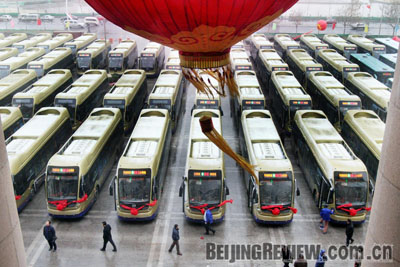|

AUTO TREND: Several Chinese automobile manufacturers are now producing
energy-efficient hybrid vehicles, hoping more car buyers will opt for
this kind of vehicle given the rising price of gasoline
China's automotive manufacturers already have won over some of the country's most hard-nosed auto consumers to the nascent hybrid vehicles market-taxi drivers.
"Hybrid vehicles are indeed much more fuel efficient," Yang Fusheng, a Beijing taxi driver who worked for the recently concluded Olympic Games, told Beijing Review. "The Chery A5 hybrid vehicle that I'm driving now saves nearly 2 liters of fuel per 100 km compared with its predecessor, a Fukang."
China's Chery Automobile Co. Ltd. (Chery) had outbid an array of domestic rivals with its 50 hybrid vehicles to offer transport services for athletes and visitors between the Olympic venues during the Games. Yang said the vehicle had remarkable engines and control systems, and more importantly was less fuel-consuming. He said he could save around 1,500 yuan ($219) per month, which would add up to about 20,000 yuan ($2,926) a year, on gas.
The lower-emitting and energy-saving vehicles feature two power systems-an onboard rechargeable electric energy storage system and a fueled power source for vehicle propulsion. They have been deemed as the future of China's automobile sector. A string of automakers have been engaged in developing them, including the joint-venture Shanghai General Motors Co. Ltd. and Guangzhou Honda Automobile Co. Ltd., as well as local players such as the Shenzhen-based BYD Auto Co. Ltd.
Wang Hewu, an associate professor with the Vehicle Engineering Department of Tsinghua University, told Beijing Review that new-energy automobiles such as hybrid, electric and hydrogen vehicles would eventually displace traditional fuel- and diesel-powered automobiles. Deficient global power supplies and soaring oil prices have been quickening the process, he said.
Wang said that hybrid vehicles have raced ahead of other new-energy automobiles in terms of market penetration, because their maturing technologies combine combustion engines and electric motors. A variety of hybrid vehicles are now on offer in China, catering to different consumer groups, he added.
The dawn of hybrids
The debut of hybrid vehicles in China dates back to 2006 when the Toyota Prius first went on sale, but their high price tags, usually around 300,000 yuan ($43,892), turned off many consumers.
The Chery A5 Hybrid, which is the lowest priced of its kind in China, has been a relative market hit. The car sells for no more than 100,000 yuan ($14,631) domestically. Brisk hybrid vehicle sales have helped make Chery one of the country's top auto brands.
| 